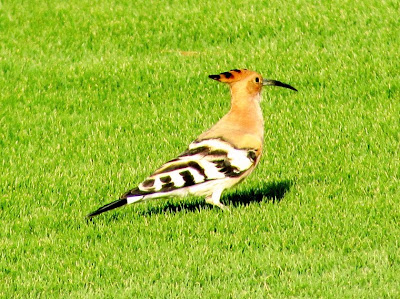This habitat is very rare for an area next to the middle of the desert south of Riyadh! and clearly attracts many birds.
On the lawn areas were nine hoopoe, a single bird and a mobile group of eight others.
hoopoe on the lawn area
Some of the area had had its turf removed presumably because it has been sold. These areas were well watered and new seed had yet to grow through or (in other places) had only just started growing.
Both the lawns and the newly planted areas had plenty of bird species in considerable numbers. I was shocked and surprised how many waders were present.
some of the re-planted area
Before I go on to talk about the waders I must mention the most abundant bird on the grassed area in general was white wagtail. There were many tens.
one of many white wagtail
We soon realised they weren't the only bird on the lawns. In the middle distance were two spur winged lapwing. This is the first time I have seen this bird in Saudi Arabia and it is recorded as an uncommon winter visitor to central Arabia.
spur winged lapwing
An hour later two northern lapwing turned up too! This is also recorded as an uncommon winter visitor (but as the next blog will tell you I will dispute this "fact").
northern lapwing, turf farm at Al Kharj
However it was in the waterlogged grass and in the newly planted areas next to them that provided the most species. There were at least six other wader species.
little ringed plover on the right
The two most plentiful waders were little ringed plover and common sandpiper. There were at least a dozen of both.
common sandpiper (upper) with little stint (lower)
There were several stint. Most were little stint.
two little stint (left) and a temminck's stint (right)
However, at least two of the stints at the farm were temminck's stint. One of them is pictured above.
Two other waders which were present but not pictured were green sandpiper and ringed plover.
Needless to say the guide books and records don't show any of these waders as been at all common in central Saudi Arabia in winter (or any other time). I don't yet know how unique this habitat is to challenge this assertion. However, you could argue with tongue only slightly in cheek that their status is locally common!
a tame isabelline wheatear
For the record there were also a small number of crested lark on the grass and a couple of Isabelline wheatear were spotted on the edge.
In the hedges surrounding the farm were mixed flocks of house sparrow and Indian silverbill too. Some white cheeked bulbul sometimes interacted with them. Seeing them ensured that we saw over 20 species on the farm.










No comments:
Post a Comment